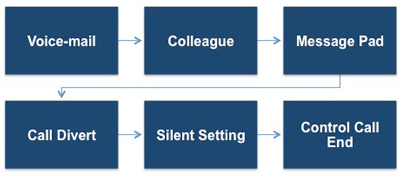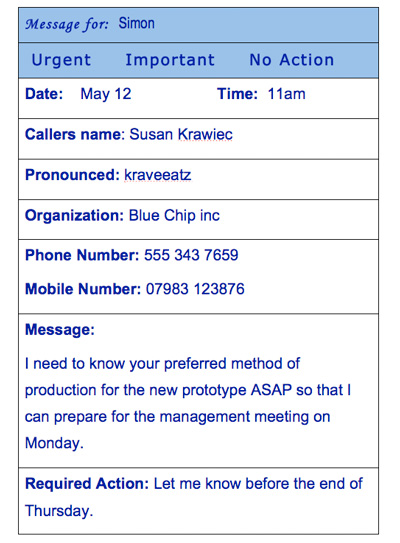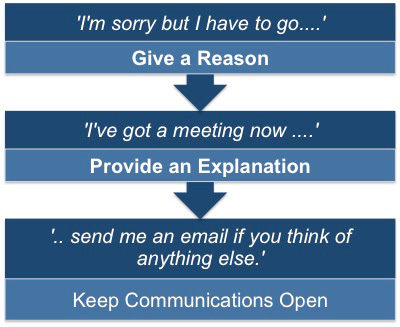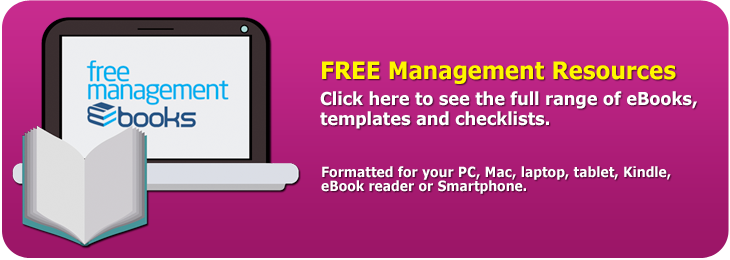Managing Phone Interruptions at Work
The number of phone calls you receive in any one day can often be one of your major sources of interruptions, with the additional disadvantage that the callers are oblivious to any of the barriers mentioned above or your use of body language.
 |
The most effective way to manage this type of interruption is to make use of the technology that phones provide - for example, Voicemail, call divert, and silent settings to name a few.
The key to your success is to ensure that you do your best to reduce these interruptions by phone. Such calls break into your train of thought and destroy your concentration. Not only does this reduce your effectiveness on your current task, more often than not you have to break off totally to solve a problem raised by the interrupting caller, or find information they require.
It is often impossible to reduce your calls completely during your protected periods, so you must expect to have to still handle those requiring your immediate attention. Often the best way to filter your calls is to set up a Voicemail on your phone or PDA.
The message your callers receive must be concise and tell them when they can expect you to return their call. The nature of your role will determine whether or not you are able to specify when you will return their call.
To avoid falling into a common trap of Voicemails you must keep the message up to date, and must not let your phone go to Voicemail all the time. If you leave it on permanently or the majority of the time, people will quickly learn it's a bluff and will find other ways to disturb you. Making yourself available is an essential element of your role; you just need to ensure that you have some control over the interruptions.
An example of an effective Voicemail message is:
'Hi, you're through to Simon's Voicemail on Friday, May 12. I'm out of the office until 2:30. Please leave a message after the tone and I'll return your call today. If it is urgent please press "0" and ask for Iona Skelling . . .'
As this Voicemail suggests, another way to manage your call interruptions is to have a mutual arrangement with a colleague where you each take the other's calls if the need arises. You must select your colleague carefully and be sure of their skill and knowledge to handle the call satisfactorily.
A well-designed message pad will ensure that whoever takes the message on your behalf obtains all of the relevant details you need. This message pad also means that all of your messages are kept neatly in one place and are not left scattered over your desk where they could get lost or misplaced.
This is a work practice you could introduce throughout your team or department to ensure all messages are dealt with professionally. In the example below you can see that all of the essential information you need has been taken down - full name, phone number, reason for call, and any action the caller requires of you.
 |
As part of your working practices, you can make sure that you always adopt an efficient phone manner. This can ensure that you minimize unhelpful small talk with callers and maximize your effectiveness. Your tone of voice and words can convey welcome without encouraging small talk, and maintain the focus of the conversation.
For example:
'Hi James, good to hear from you, what can I do for you today?'
If you feel the purpose of the call requires greater attention than the time you have currently available, then arrange to speak or meet at a more convenient time. You can also use this additional time to come to the call better prepared to answer the questions posed in the original call. In this way your caller feels they have been heard and leaves the call satisfied rather than irritated.
Finally, one of the most important aspects of control is how you end your call. It is essential that when your caller puts down their phone, they feel that they have been listened to and that you have taken on board the purpose of their call.
 |
Even once the objective of the call has been achieved, many callers will continue to talk, which now means they have become an interruption to your effectiveness. In this instance, you need to regain control of the call by using each of the three techniques below:
• Make it clear by giving a reason for ending the call - 'I'm sorry but I have to go ...'
• Give an explanation why - '… I've got a meeting now ...'
• Keep communications open - '… send me an email if you think of anything else.'
You may also be interested in:
Handling Interruptions | Controlling Interruptions | Identifying Interruptions | Limiting Inappropriate Socializing | Techniques to Minimize Interruptions | Cold Call Elimination | Managing Your Outbound Calls | How to Stop Constantly Checking Emails.



